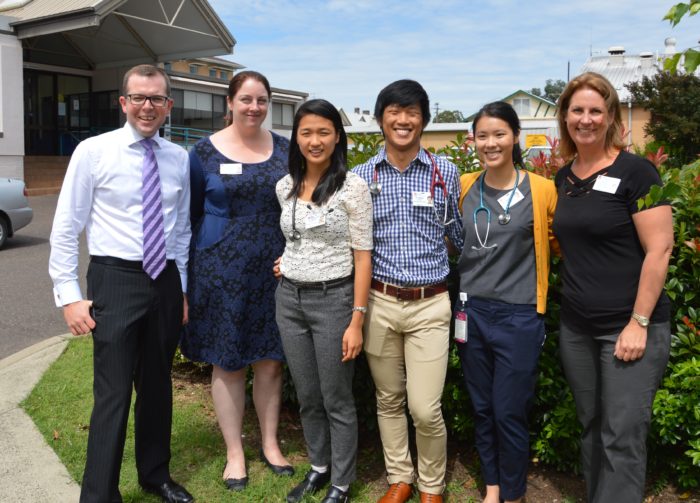
1. Northern Tablelands MP Adam Marshall, left, welcomed new medical interns to Armidale Rural Referral Hospital today, Specialist Physician Dr Rachel Chalmers, JMOs Dr Rena Ng, Dr Daniel Phung and Dr Natalie Yeung and Acting Hospital Operations Manager Kylie Whitford.
2. New Armidale Hospital medical interns Dr Rena Ng, Dr Daniel Phung and Dr Natalie Yeung showing discussing some of their patient charts with Northern Tablelands MP Adam Marshall today
MEMBER for Northern Tablelands Adam Marshall today welcomed three new medical graduates who are commencing their internships at Armidale Rural Referral Hospital this year.
Mr Marshall caught up with the three junior doctors this morning on their first day on the job at the hospital. They will be joined by six more of their colleagues next week.
“On behalf of the community, I welcome our new intern Doctors Rena Ng, Daniel Phung and Natalie Yeung to Armidale,” Mr Marshall said.
“They’ve chosen a great place to begin their medical training and are in excellent hands as the staff here at the Armidale Hospital are highly professional and committed to delivering the very best medical care to the community.
“Rural health offers a totally different experience for graduates – they have the opportunity, not afforded in the city, to experience a wide variety of cases.
“It also introduces them to the joys of living in a rural areas, although in the case of two of our new Junior Medical Officers, they know the area well having studied medicine here at the University of New England.
“This shows the benefits of training and teaching clinicians in a rural setting and I hope they will chose to return when their training is complete.
“I’m sure they will enjoy their 11 weeks here and I wish them all the very best in their training and future careers – I would like to think we will see them back here one day,” he said.
Mr Marshall said NSW is the only state to offer two-year employment contracts to medical graduates commencing their internship.
“Over these two years, the junior doctor rotates through a network which includes metropolitan, rural and regional hospitals,” he said.
“This exposes them to a range of clinical scenarios at the outset of their training and supports them to complete their compulsory internship rotations in medicine, surgery and emergency.
“Having gained general registration, the interns continue their second year of networked training as residents.”
Mr Marshall said the state’s unique Rural Preferential Recruitment Scheme would enable 115 medical graduates to spend the majority of their first two years working in a rural setting.
“Nineteen Aboriginal medical graduates commence their training today, three in rural hospitals,” he said.